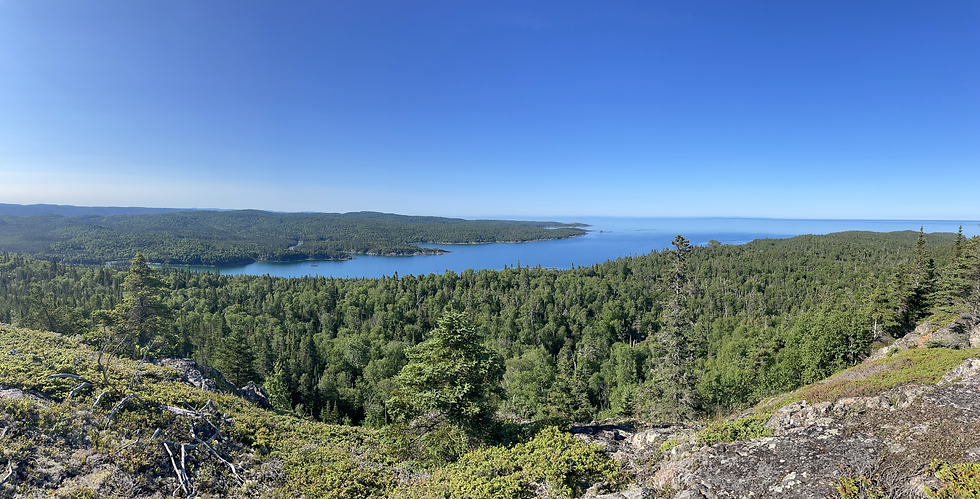Trail Towns and The Trail Economy: Exploring the Benefits
- Jane McCulloch

- Jan 24, 2022
- 4 min read
Updated: Oct 24, 2023
by Jane McCulloch

An unexpected outcome of the COVID-19 pandemic has been the increase in trail usage, and it is expected that the newfound interest in accessing the outdoors through trails will continue to grow as we begin to become accustomed to a "new normal". The increased interest in trail use presents a tremendous opportunity to capitalize on the popularity of trails and foster the development of a strong trail economy. A strong trail economy will help bolster the economic recovery of many of the small communities across Canada who have been hit hard by lockdowns and loss of jobs.
Building a Strong Trail Economy
Many countries, such as the United States, England and Germany have capitalized on the trail economy; however, Canada has not come close to realizing its full potential to develop a strong greenway trails economy. There are some very good regional Canadian examples, particularly in the province of Quebec; however, there is so much more that can be done!
The trail economy is the idea of generating both indirect and direct revenue through the development and promotion of trails as a product. This however is not a “build it and they will come” scenario; it will require significant engagement between trail managers and builders working hand in hand with outfitters, business owners and community leaders to ensure that there is a strong integration between all stakeholders. What it doesn’t require, however, is significant investment of funds to get these relationships developed.
The Trail Town Model
People often think they need to invest a tremendous amount of funds to develop a tourism product, however many communities already have trails developed in their backyard that are ready to welcome tourists and residents alike. The key to developing a strong trail economy is through the development of unique partnerships and providing tools for existing businesses to diversify their services in order to meet the needs of the trail tourist.
With a bit of creativity and forward-thinking individuals and businesses, many small communities can meet the needs of the trail tourist and can take a small step to creating opportunities for people to spend money in their communities. As more people begin to come to the region to use trails, whether its cyclists, hikers, snowmobilers or other trail users, the region will be able to improve and expand its offerings. It will, however, be important to have a vision established for the future and not left to react when the region can no longer meet the demand of the trail users.
There aren’t cash registers on the trail. If you want trail users to boost your local economy, you have to tap your town into that opportunity- actively. Move your whole community forward by transforming into a trail-friendly destination where people want to stay, explore, and spend.
It is also important to realize that this is not simply for the benefit of the trail tourist. Creating new opportunities and experiences for tourists, also helps improve the quality of life of regional residents. It also becomes appealing to people who are looking to relocate and are searching for a relaxed and laid-back way of living in a region that provides access to the natural environment and cultural experiences, while also providing them with the key amenities that they are looking for. As such, its a great way to attract new residents, and businesses, to your region.
Take the leap and create experiences around your trail product that will help stimulate the economy of your region - whether its food and beverage, gear rentals or repairs, accommodations, or cultural heritage interpretation. It is amazing what can happen when you believe in the value of trails and what they can do for your community.
Implementing the Trail Town Model in Canada
In Ontario, a "Bike Friendly Business" program already exists. As highlighted in our January 2022 newsletter, The Trail Research Hub Digest, the Ontario By Bike™ Network offers cyclists a variety of information on cycling in Ontario including great places to cycle, links to useful cycling maps and resources to plan day trip or multi day cycling trips with stops at certified bicycle friendly businesses en route. For tourism industry partners, the Ontario By Bike™ program develops and promotes cycle tourism in Ontario through an established business network. This program certifies and promotes bicycle friendly businesses and cycle tourism and is open to accommodations, food services, attractions, cycling related businesses and organizations interested in cycle tourism. There are currently over 1,500 businesses certified as bicycle friendly, in regions spanning Ontario. Hub-affiliated Researchers and partners at the University of Waterloo are currently using this model to explore the tourism readiness of business within the Grand Watershed Trails Network.
Work is also currently underway on the development of a “bicycle friendly program” for the Veloroute de la Peninsule acadienne in New Brunswick. This set of criteria will ensure that the businesses in the region are catering to the trail tourists, thus creating a strong trail economy for the region and is being spear-headed by Hub-affiliated Community Liaison Jane McCulloch, through her work as the Principal of Terminus Consulting. In 2021, the trail saw over 80,000 visitors (during a pandemic!) and it is expected that with similar numbers in 2022, roughly $5,000,000 to $7,000,000 in revenue will be generated in the initial few years of the program.
Get In Touch
If you are interested in learning more about the trail town model, in creating a strong trail economy in your municipality of region, or are curious about how a strong trails sector can help your community recover from the economic impacts of the COVID-19 pandemic, please reach out to us at: TheTrailResearchHub@gmail.com.
Additional resources
Creative Trails Canada - https://creativetrailscanada.com/
Terminus Consulting - https://www.terminusconsulting.ca/
Cycle Forward - https://www.cycleforward.org/
Deciding on Trails: 7 Practices of Healthy Trail Towns (Paperback Book) - https://www.amazon.ca/Deciding-Trails-Practices-Healthy-Trail/dp/B08RH5N1T5



